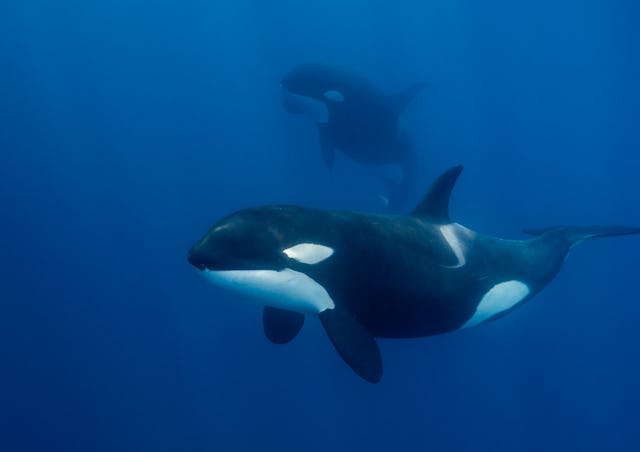Killer Whale Moms Often Stop Having Kids To Take Care Of Their Needy Adult Sons
A new study has found that male orcas often mooch off of their mothers for their entire lives.

Animals are just like us, right? Well, you can draw your own conclusions. A new study has found that killer whale moms often look after their needy male offspring long after they’re adults — and even forego food and further expanding their family in order to baby their spoiled boys.
The study, which was published in the latest issue of the scientific journal Current Biology, examined the “costly lifetime maternal investment” in three pods of killer whales living in the Pacific Ocean over a span of 40 years. What they found is totally new information about how whale family units work, and the fact is that it’s rough to be an orca boy mom.
"We've known for over a decade that adult male killer whales relied on their mothers to keep them alive, but it had never been clear whether mothers pay a cost to do so," Michael N. Weiss of the University of Exeter, U.K., and the Center for Whale Research in the U.S., told PhysOrg.
When a female killer whale has a daughter, she grows up, leaves her mother’s side and becomes a functioning member of the pod, whether or not she herself begins having offspring.
But when a female killer whale has a son, he will often stay at her side for years, even for the entire rest of her life, eating her leftovers and acting like a juvenile calf no matter his actual age. While he might leave her side to mate, he soon returns, letting someone else raise his baby while he continues to act like one.
“You’d think that a big killer whale male would be able to take care of himself,” Janet Mann, a behavioral ecologist at Georgetown University, told Science.
While this story might at first seem a bit cute (and very anthropomorphic), there’s a darker side to this lopsided arrangement. The mom whales are often deprived of food in order to keep their sons well-fed, and they also give up on having more babies if they still have a son who sticks around, taking resources.
In fact, in any given year of the study, a mother killer whale was 70% less likely to have another calf if they still had a son “living at home.” And it didn’t matter whether the son was still only three or a hearty 18 years old. If a orca didn’t have kids or if she had a daughter, her chance of having more offspring was the same.
“This hasn’t really been looked at before,” said Eva Stredulinsky, an aquatic biologist at Fisheries and Oceans Canada also told Science in the same story. “It provides the first definitive description of what this support costs mothers.”
So, if you have a full-grown human son playing video games in your basement right now, maybe you can blame it on Mother Nature’s mysterious ways? Or maybe you should consider not giving him free salmon every night?
Of course, researchers think there are good evolutionary reasons for this needy son phenomenon. A mama’s boy can reproduce with more killer whales and produce more offspring than a single female, and killer whales are one of the few animals that, like humans, go through menopause. That means that after they lose their ability to have kids, it’s good for the species for moms to continue taking care of adult members of their family.
"Females gain evolutionary benefits when their sons are able to successfully reproduce, and our results indicate that these benefits are enough to outweigh a large direct cost," Weiss explained in his interview.
More research remains to be done. Mann suggests that other populations of killer whales should be studied, in addition to other marine mammals. Still, we know for sure that this type of treatment is rare in the animal kingdom.
As for any clingy adult males living in your “pod”? Maybe there’s an evolutionary reason for it.
This article was originally published on